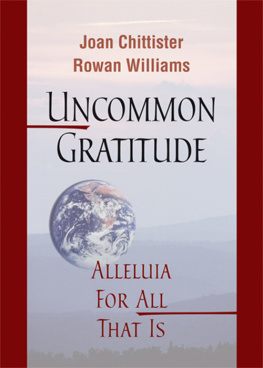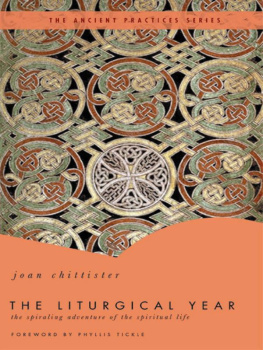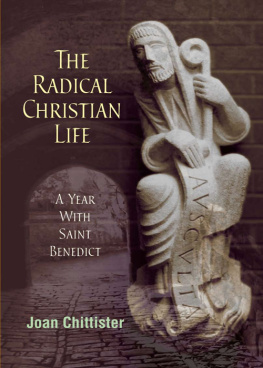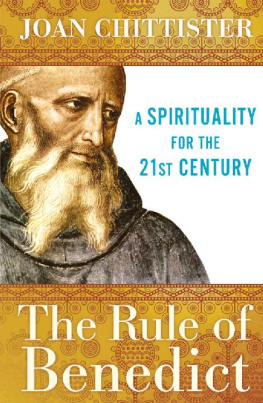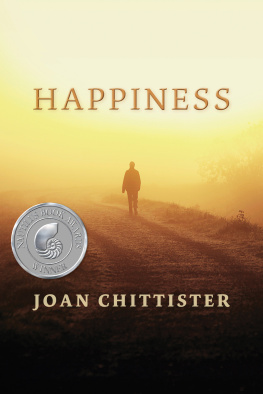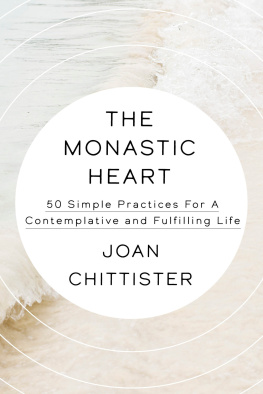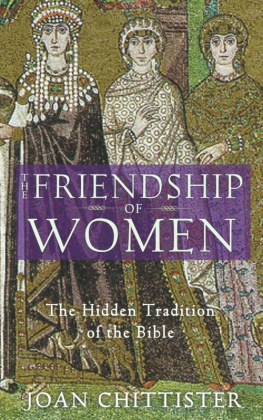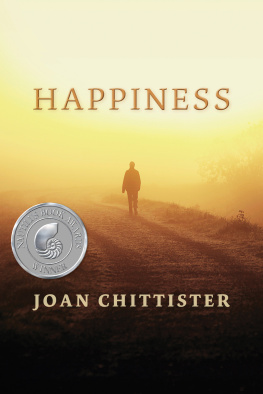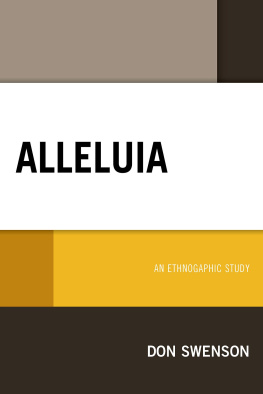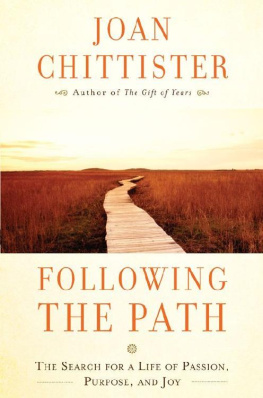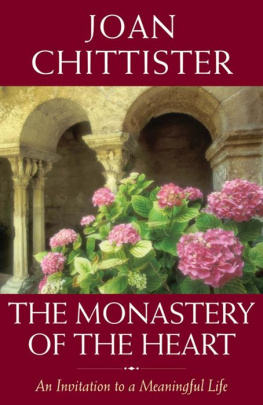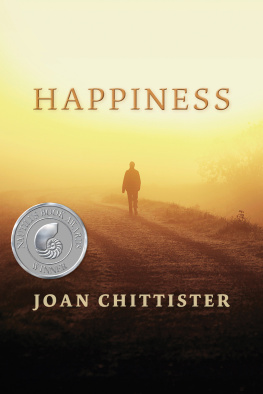Joan Chittister - Uncommon Gratitude: Alleluia for All That Is
Here you can read online Joan Chittister - Uncommon Gratitude: Alleluia for All That Is full text of the book (entire story) in english for free. Download pdf and epub, get meaning, cover and reviews about this ebook. year: 2010, publisher: Liturgical Press, genre: Religion. Description of the work, (preface) as well as reviews are available. Best literature library LitArk.com created for fans of good reading and offers a wide selection of genres:
Romance novel
Science fiction
Adventure
Detective
Science
History
Home and family
Prose
Art
Politics
Computer
Non-fiction
Religion
Business
Children
Humor
Choose a favorite category and find really read worthwhile books. Enjoy immersion in the world of imagination, feel the emotions of the characters or learn something new for yourself, make an fascinating discovery.
- Book:Uncommon Gratitude: Alleluia for All That Is
- Author:
- Publisher:Liturgical Press
- Genre:
- Year:2010
- Rating:3 / 5
- Favourites:Add to favourites
- Your mark:
- 60
- 1
- 2
- 3
- 4
- 5
Uncommon Gratitude: Alleluia for All That Is: summary, description and annotation
We offer to read an annotation, description, summary or preface (depends on what the author of the book "Uncommon Gratitude: Alleluia for All That Is" wrote himself). If you haven't found the necessary information about the book — write in the comments, we will try to find it.
Uncommon Gratitude: Alleluia for All That Is — read online for free the complete book (whole text) full work
Below is the text of the book, divided by pages. System saving the place of the last page read, allows you to conveniently read the book "Uncommon Gratitude: Alleluia for All That Is" online for free, without having to search again every time where you left off. Put a bookmark, and you can go to the page where you finished reading at any time.
Font size:
Interval:
Bookmark:
Uncommon Gratitude
U NCOMMON G RATITUDE
Alleluia for All That Is
Joan Chittister, OSB
and
Archbishop Rowan Williams

LITURGICAL PRESS
Collegeville, Minnesota
www.litpress.org
Cover design by Ann Blattner.
Permission for the following was in process at the time of publication: Excerpt from East Coker from Four Quartets in T.S. Eliot, Collected Poems 19091962 (London: Faber and Faber, 1963).
2010 by Order of Saint Benedict, Collegeville, Minnesota. All rights reserved. No part of this book may be reproduced in any form, by print, microfi lm, microfi che, mechanical recording, photo copying, translation, or by any other means, known or yet unknown, for any purpose except brief quotations in reviews, without the previous written permission of Liturgical Press, Saint Johns Abbey, PO Box 7500, Collegeville, Minnesota 56321-7500.
Printed in the United States of America.

Library of Congress Cataloging-in-Publication Data
Chittister, Joan.
Uncommon gratitude : alleluia for all that is / Joan Chittister and Rowan Williams.
p. cm.
ISBN 978-0-8146-3022-8
Ebook ISBN 978-0-8146-3929-0
1. GratitudeReligious aspectsChristianity. I. Williams, Rowan, 1950 II. Title.
BV4647.G8C45 2010
241.4dc22
2009045601
* written by Joan Chittister
written by Archbishop Rowan Williams
Someplace along the way, in the early years of my growing up, I heard someone explain that people who went to heaven would sit at the throne of God and sing Alleluia all day long. Oh, no, I groaned inwardly. At that moment, heaven, however important it remained in my young mind, lost some of its immediacy, if not some of its luster.
Then, I grew up and realized the import of what it might really mean to be able to sing alleluia all day long, every day of your life. The very thought of it spun my world in an audacious new direction. What if life itself was meant to be one long alleluia moment? Here, indeed, resided the real meaning, the real hope, of life. But was it possible?
Years passed, however, before Archbishop Rowan Williams and I found ourselves agreeing to write a book together. We were both clearly marked by a monastic mindset that valued reflection above all else in the marketplace of spiritualities. Both of us took ideas as seriously as we took footnotes. God, we knew, was a mystery in which we lived every moment of every day. The only question is, How? What kind of a God is this God we seek?
Is God a teasing giant who must be pacified as we go through life? Is life an obstacle course designed to merit only the perfect, only the docile? Or is the human condition a bundle of gifts wrapped in darkness, the life task of which is to learn to recognize Goodness/Godness in all its misty forms?
One thing we were sure about: The presence of God in life required conscious contemplation. All the richness, all the manifestations of God in life could not be reduced to catechism answers. And yet, at the same time, in the God who was not amenable to simplification are all the answers a person needs to live a life full of confidence in what is seen, and also to take as a given the gifting of the unseen as well.
Finally, I asked him directly, What really interests you most about the spiritual life? He paused a moment. I find myself coming back again and again, he said, to the meaning of alleluia.
And then we were off. It took two days of thinking together in the archbishops London office at Lambeth Palace to find our way through to what we were both saying in slightly different accents: Life itself is an exercise in learning to sing alleluia here in order to recognize the face of God hidden in the recesses of time. To deal with the meaning of alleluia in life means to deal with moments that do not feel like alleluia moments at all. But how is it possible to say alleluia to the parts of life that weigh us down, that drain our spirits dry, that seem to deserve anything but praise?
The question is a worthy one. Life, after all, is a struggle, a journey in uncharted space, an exercise in both gain and loss, joy and sorrow. No life consists of nothing but success and satisfaction, security and self-gratification. Failure and disappointment, loss and pain are natural parts of the human equation. Then what? What use is an alleluia then, except perhaps to encourage some kind of emotionally unhealthy self-deception?
But alleluia is not a substitute for reality. It is simply the awareness of another whole kind of realitybeyond the immediate, beyond the delusional, beyond the instant perception of things.
One of the oldest anthems of the church, alleluia means simply All hail to the One who is. It is the arch-hymn of praise, the ultimate expression of thanksgiving, the pinnacle of triumph, the acme of human joy. It says that God is Goodand we know it.
In the Hebrew Scriptures, the word is an injunction to praise, a call to the people to summon up praise in themselves. It is a challenge to see in life more than is seeable in any single moment and to trust it.
In the Christian Scriptures it is a formula of praise. Most of all, it is an intensely emotional response that, in early liturgical use, was said the entire year, as it still is in the Eastern Church, even in liturgies for the dead. In the most ancient part of the Christian tradition, then, it calls us to see all of life as life-giving, somehow, in some way, whether its present gifting is apparent or not.
Every segment of life is both gift and challenge, both endowment and responsibility. It is the warp and woof of the fabric we call time. The delicate interplay between the two has the power to rock us back and forth between total confidence and abject despair. We lurch through life between doubt and faith, between security and cloying uncertainty, between the enrichment that comes from differences and the divisions that come from fear. It is learning to cling to a sense of alleluia for both that carries us through life to that moment when everything in us has come to fullness and our only next step is immersion in God.
This book sees alleluia as a call to reflection, as the basis of contemplation, the final Amen to all that is, at whatever its cost to us now.
Archbishop Rowan Williams deals with scenes from everyday life with the eye of a realist who believes in God.
I, on the other hand, look at some of the defining moments those scenes imply and peel them back to discover what is under them of spiritual value and what is in them to take us to even greater spiritual heights.
The book is, then, a kind of dialogue between two people, both of whom are deeply involved in the urgency of pastoral demands but equally involved in understanding the relationship between what is now and what is meant to become in us in our private little futures.
It is an alleluia view of every present moment, a view that welcomes its complexity and subjects it to the more lasting view, the long view, of life.
To that, alleluia.
Joan Chittister
W E A RE


When the attack on New Yorks World Trade Center happened on September 11, 2001, it wasnt world politics that got global attention. Ironically enough, religion, not U.S. foreign policy, became the question of the age. As the Twin Towers came crashing down, the historical notion of the role of religion in the modern world crashed with them.
Font size:
Interval:
Bookmark:
Similar books «Uncommon Gratitude: Alleluia for All That Is»
Look at similar books to Uncommon Gratitude: Alleluia for All That Is. We have selected literature similar in name and meaning in the hope of providing readers with more options to find new, interesting, not yet read works.
Discussion, reviews of the book Uncommon Gratitude: Alleluia for All That Is and just readers' own opinions. Leave your comments, write what you think about the work, its meaning or the main characters. Specify what exactly you liked and what you didn't like, and why you think so.

